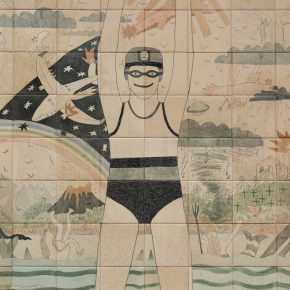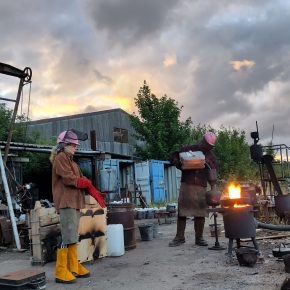Quickfire Cost of Living Questions to ESW Members
In October 2022 we asked our Members to answer a set of questions relating to the cost of living crisis, their practice and their relationship to their local arts organisations.
Our Members are a cross section of practitioners who are artists and others who are active in creative processes. Some use our facilities a lot and others are involved in the different layers of community and information which we provide.
The survey was partly prompted by the opportunity for ESW to feed into a Roundtable Event at the Scottish Parliament which was convened by Sarah Boyack MSP. The meeting happened during a period of other committee meetings and reviews of evidence which accompany the pre-budget scrutiny process. The Roundtable Event was focused on discussing the effects of the cost of living crisis on arts organisations so we used this phrasing to construct the set of questions, starting with Because of the increase in cost of living, I have… and we gave standard options to reply yes, no, or considering.
- We found that 56% of respondents had already reduced their spending on their artwork / practice, with a further 31% considering this.
- The same proportion, 56%, had turned down opportunities because they couldn’t afford them, with a further 14% considering this action.
- Looking at the wider context, almost half of respondents said that they had noticed A drop off in demand for my work, opportunities or sales.
- When asked if they had to limit the time they spent on their art practice 67% replied that they had, with another 17% considering doing so.
- In parallel to this, 44% had had to take on additional (non-artist) work, with another 15% considering this.
- The creative impact of this change in allocation of time was also reflected as 29% said that they Have changed to working on commission, no ability to spend time or money on experimentation with another 34% saying that they were considering it.
- A fifth of respondents had considered leaving the arts entirely to pursue work in another sector.
- In terms of other concrete impacts, over half of respondents had made significant changes to their lives or were having to consider this, for example selling a car, moving into shared accommodation, moving back to family home, leaving education, retraining.
- Looking more to the interplay between practitioners and organisations, a third of respondents had not been able to book for a course because of the financial situation, with another 17% considering this. For ESW course fees are a small part of our earned income but they are also a way in which we employ artists.
- When the questions focused more on the relationship to organisations almost half said they had to rely more heavily on my local arts organisation for work, support, information or space to spend time, with a further 20% of people considering this.
- Over two thirds, 71%, said that they had become concerned about the stability of the arts in the current situation, with a further 15% considering this.
The second part of the survey gave the opportunity to add narrative comments. Several people shared further detail of their personal situation and many reflected on the arts economy over time, considering how now was similar and different to the past. Some commented that culture funding was always discussed favourably but never followed through on and often became a political weapon between parties. There are a few selected excerpts here:
Focusing on work is hard because I have worries and financial issues that need to be given time.
I am currently working towards a retrospective show. I committed to it before the current crisis. The massive increase in cost is a big problem and I had to compromise some of the artistic decisions.
The 12 years of austerity measures, combined with the already low margin of income creatives make in Scotland, alongside the impact the impact the pandemic had on Art Workers income meant that take home pay was already at an all time low. Now with budgets being stretched even more, this cost of living crisis with rising bills and stagnation of wages/fees has been a huge contributor of additional stress.
I have had to cut back on working because I cannot afford childcare.
This pressure is not conducive to thriving or creating- we are in survival mode.
We need action to change this continual downward turn and we already have the answers to how it can be improved. Reverse the cuts that have been made over recent years, tax those with expendable income over certain thresholds, bring in Universal Basic Income, protect current and advocate for bigger budgets for cultural organisations and build more funds for Creatives and ArtWorkers.
We are struggling to withstand this current situation. The present cost of living crises is just one of a litany of crises that stretch back many years.
I can’t remember a time when there was any kind of funding stability for arts organisations or any viable financial position for artists within the economic environment.
There is no viable market place for art in Scotland, very few commissions, inadequate state funding and far, far too many artists.
Cost of living is not just due to Covid, but also Brexit.
I have had to get rid of my car and this means I will not be able to accept work outside of my local area… work in rural areas… (is) completely out the window now.
I am relying on the studio more as a warm and bright place to be.
Struggling to pay my bills so am prioritising my time for earning money not being the studio.
Have not applied for residencies as I knew I would be able to afford paying for them.
Have not been able to buy new materials.
I’m retired with income so answers are a little skewed but I think about ESW, its people and members a lot. V keen to keep the doors open for all.
My independence and career has been affected, there are definitely much fewer opportunities coming my way and my earnings are down hugely.
I’d be very distressed if ESW and other local arts organisations had to limit their activities because of the cost of living crisis. Not only because it would affect what I am able to learn but, more importantly, because of the potential impact on practicing artists who depend on the facilities and support and the support and admin staff who would also be affected by any reduction in activity.
Working solely commission based and struggle to experiment.
As someone who lives in a rural area, the impact is definitely affecting my travel considerations as I need to come into town to access any kind of arts facility to support my practice – the cost of this is becoming prohibitive.
I have to consider which arts subscriptions I can realistically maintain which could mean withdrawing from ESW membership.
As well as concerns about my personal finances, and those of other artists and creative people, the likely contraction of all arts organisations due to increased basic costs is of extreme concern to me. These already precarious organisations are essential artistic communities, but also the social ecosystem of their localities. The domino effect of any reduction in activity or closures, will lead to increased pressure on those organisations that remain, and also produce cold spots of artistic vibrancy and community focus.
Small arts organisations are difficult to re-start, when lost, and protecting them at this point is crucial weather this ‘extraordinary storm’.
The affect of increased fuel costs to charities, arts or otherwise, should be a priority for the Scottish Government / UK Government, because these organisations by their very constitutions are have been established for the widest benefit – and as Covid has shown, these were the organisations able to operate deftly.
Life has always been difficult for artists, but now it seems to be particularly hard.
Artists and arts organisations are embedded in their communities and provide a myriad of support, opportunities and possibility to those they connect with.
The increasing cost of living is making the career choice of being an artist much less sustainable.




